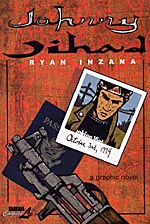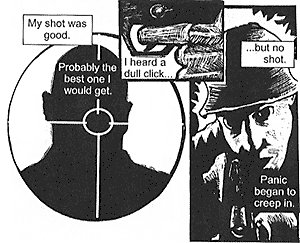 By Ryan Inzana
By Ryan Inzana
96 pages, black and white
Published by NBM
When John Walker Lindh was first captured by US forces, I remember hearing a lot of shock and outrage. “How could an American fight with the Taliban!” was the phrase of the day, and the reaction by quite a few people. In the case of Ryan Inzana, though, one gets the impression that he saw the news report and said, “I’ve got an idea for a graphic novel.” And now, just as people have forgotten all about Walker Lindh, we’ve got Johnny Jihad.
It would be easy to blame Johnny Sendel’s descent on his family, but that’s not fair; it was merely the first step in his downward spiral. Feeling isolated and outcast from the rest of the world, Johnny slouches through life, unable to find anything or anyone to really care about. Then a co-worker introduces him into a strong fundamentalist sect of Islam, and it consumes Johnny’s life. Grasping onto the words like a life vest, Johnny quickly finds himself in a radical Muslim training camp, one of many based in the United States. But this, too, is only one of the first steps in Johnny’s life…
When I first started reading Inzana’s Johnny Jihad, I was absolutely entranced. Johnny’s story is gripping in part because it’s very believable; you can see this chain of events unfolding all too easily. I think that’s one of Inzana’s strengths, here, in that he’s able to evoke the “it could happen to someone you know” card, keeping the emotions and journey down the road to hell (paved with the best of intentions) understandable and generic enough. Maybe that’s why the last third of the book falters so badly, when Johnny is suddenly entangled with the CIA and meeting with Al Qaeda. Suddenly it’s leapt into unrealistic territory, like how all bad time travel stories coincidentally just happen to involve the famous people of the time period. (It’s a miracle Abraham Lincoln had time to eat lunch, what with all of those time travelers that keep meeting him.) It’s an unfortunate misstep by Inzana, and it derails an otherwise entrancing story that really should have stopped while the going was good.
 Fortunately, Inzana’s woodcarving-styled art continues to impress throughout the whole book. Each panel looks like it’s been scratched into existence from an unyielding block of material, its bleak look matches Inzana’s story perfectly. Where it lacks in subtlety (the World Trade Center towers looming in the background as Johnny drives to the radical Muslim compound, for instance) it makes up in power. Johnny’s dreams would be laughable if drawn almost any other way, but here they seem suitably chilling. Likewise, the series of panels for Johnny’s first killing work perfectly, moving the reader’s eye up and down in a series of tense moments. Even when the story falls apart towards the end, Inzana’s art is worth reading on for.
Fortunately, Inzana’s woodcarving-styled art continues to impress throughout the whole book. Each panel looks like it’s been scratched into existence from an unyielding block of material, its bleak look matches Inzana’s story perfectly. Where it lacks in subtlety (the World Trade Center towers looming in the background as Johnny drives to the radical Muslim compound, for instance) it makes up in power. Johnny’s dreams would be laughable if drawn almost any other way, but here they seem suitably chilling. Likewise, the series of panels for Johnny’s first killing work perfectly, moving the reader’s eye up and down in a series of tense moments. Even when the story falls apart towards the end, Inzana’s art is worth reading on for.
Johnny Jihad is a flawed book, but that’s amusingly appropriate for a book with such a flawed protagonist. The good parts more than outweigh the bad, though, its biggest fault merely being for continuing a little too long. The parts that do work are powerful enough that I have no problem in recommending it to others; it’s one of the few books born out of this whole “war on terror” that succeeds on its own merits. Kudos to Inzana and NBM for publishing a book that will certainly not make them friends in some circles.
